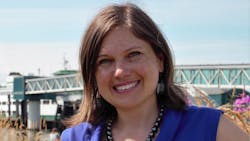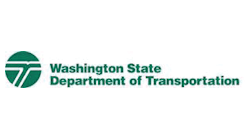- One word to describe yourself: Curious
- Alma Mater: University of Washington
- Favorite hobby: Drawing and painting on a mountaintop or next to a wild river
- Fun fact about yourself: I have flown my paraglider on every continent except Antarctica.
- Favorite station or stop that you have ever visited or frequent: The first BRT station I visited in Bogota in 2006 changed my life. It taught me that there is a totally different way to provide public transit (off-board fare payment, all-door loading, etc) and that transit can be designed in such a way that people who don’t speak the language can still successfully navigate it.
- Favorite route you have ever ridden or frequent: The train from Casablanca to Fez in Morocco showed me a slice of life I may not have otherwise seen. From the man silently praying in a heavy wool coat on a hot day, to the young woman in skinny jeans and heels listening to her iPhone. From the fields of sheep and simple houses along the countryside, to the industrial outbuildings of the cities. This 3.5-hour train ride taught me that as a solo-traveling, white American woman, I could feel welcome on public transit just about anywhere.
Michelle Zeidman is a planning analyst and the Washington State Department of Transportation (WSDOT)--Washington State Ferries (WSF), where with limited tools and resources, she and her colleague, Justin Resnick, work to optimize the on-time performance of 160,000 yearly sailings and create sailing schedules that must consider ridership, vessel maintenance and preservation needs, fuel consumption and operational efficiencies and more.
Zeidman and Resnick complete these tasks without any sophisticated software or modeling tools; they primarily employ their intelligence, creativity and an inclusive approach to problem-solving that focuses on community and employee engagement.
When the COVID-19 pandemic hit Washington state, Gov. Jay Inslee and other state leaders had to respond quickly to a growing crisis, and Zeidman was a key performer in this regard. As ridership plummeted to 35 percent of its typical capacity, Zeidman and Resnick have been working every day–including weekends—to provide executives with real-time updates on ridership, help make difficult service reduction decisions and overhaul schedules that would normally take months to overhaul in a matter of days.
Some of the work product is being delivered directly to the governor as he also needs to consider traffic and transit data to inform his own decisions. Zeidman and Resnick are accomplishing all this work remotely, without any special transportation planning technology or tools.
As a result, the rest of WSDOT and other transit agencies are looking to WSF as a model of how to respond to service reductions in a time of crisis.
Zeidman serves on the City of Seattle’s Transit Advisory Board. She is also helping WSDOT put together a multimodal transportation system performance dashboard to help other agencies respond to the pandemic.
"Every day I wake up excited to use data to better understand human behavior and trends, and how they relate to the services provided by WSF. I love jigsaw puzzles, and because WSF system has so many parts, it’s like a giant puzzle to solve. I get a detailed view of all the pieces and put them together so that others can see the big picture about what’s working and what’s not.”
“Listen to and engage with front line staff and customers. They have critically important perspectives about your service and can provide valuable insights into how the system is working. They can validate data and provide nuance that hard numbers can’t easily offer. There is no substitute for visiting the fleet and talking with colleagues from across the agency.”
“I feel like I’m helping to make the world a better place for everyone in it. Transportation and social justice go hand-in-hand. In this industry, I can increase access to jobs and education, help parents efficiently get home to their children and aging elders, reduce greenhouse gas emissions and minimize climate change, improve air quality for all and provide space for neighbors to forge new friendships.”




